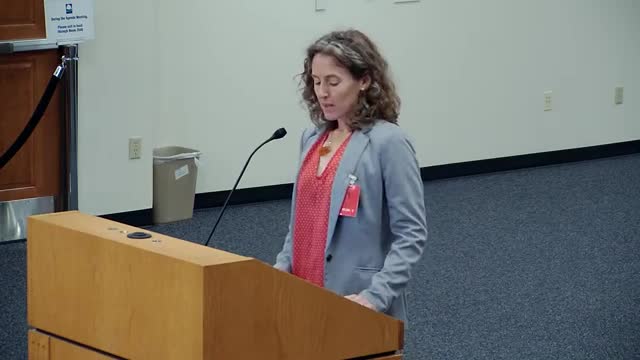Texas Prepares for Major Health Benefits from 2024 EPA Methane Rule Implementation
September 11, 2025 | Commission on Environmental Quality(TCEQ), Departments and Agencies, Executive, Texas
This article was created by AI summarizing key points discussed. AI makes mistakes, so for full details and context, please refer to the video of the full meeting. Please report any errors so we can fix them. Report an error »

The recent Commissioners' Agenda Meeting held by the Texas Commission on Environmental Quality (TCEQ) highlighted critical discussions surrounding methane emissions and their significant impact on public health and the environment. As Texas stands as the largest oil and gas producer in the United States, the implications of these discussions are particularly relevant for both the industry and the communities it affects.
Methane, a potent greenhouse gas, is known to have over 80 times the warming potential of carbon dioxide within its first two decades in the atmosphere. The meeting underscored that methane emissions are often accompanied by harmful air pollutants, including hydrogen sulfide and volatile organic compounds (VOCs), some of which are carcinogenic and contribute to smog formation. The TCEQ emphasized that reducing methane pollution not only addresses climate change but also mitigates energy waste in Texas' oil and gas sector, benefiting operators, communities, and taxpayers alike.
The implementation of the 2024 EPA methane rule was a focal point of the meeting, with Texas positioned to gain the most from these regulations. By significantly reducing emissions from the oil and gas industry, the state could see improvements in air quality and a decrease in health risks associated with VOC emissions. The discussion pointed out that the oil and gas sector is responsible for a substantial share of VOC emissions in Texas, particularly in major producing areas such as the Permian Basin, Eagle Ford, and Barnett Shale.
The health implications of air pollution from oil and gas production are alarming. Ozone pollution, a byproduct of VOCs, poses serious risks to vulnerable populations, including children, the elderly, and individuals with respiratory conditions. The meeting revealed that air pollution contributes to thousands of premature deaths and childhood asthma cases nationwide, resulting in staggering annual health costs estimated at $77 billion.
Additionally, the practice of flaring, which is wasteful and polluting, was highlighted as a significant contributor to health issues in Texas. In 2016, the state led the nation in deaths and asthma incidents linked to air pollution from flaring activities.
In conclusion, the TCEQ meeting brought to light the urgent need for effective methane mitigation strategies. The discussions underscored that addressing methane emissions is not only an environmental imperative but also a public health necessity. As Texas moves forward with the implementation of the EPA methane rule, the potential for improved air quality and reduced health risks presents a critical opportunity for the state and its residents. The next steps will involve monitoring the effectiveness of these regulations and ensuring that the oil and gas industry adheres to new standards aimed at protecting both the environment and public health.
Methane, a potent greenhouse gas, is known to have over 80 times the warming potential of carbon dioxide within its first two decades in the atmosphere. The meeting underscored that methane emissions are often accompanied by harmful air pollutants, including hydrogen sulfide and volatile organic compounds (VOCs), some of which are carcinogenic and contribute to smog formation. The TCEQ emphasized that reducing methane pollution not only addresses climate change but also mitigates energy waste in Texas' oil and gas sector, benefiting operators, communities, and taxpayers alike.
The implementation of the 2024 EPA methane rule was a focal point of the meeting, with Texas positioned to gain the most from these regulations. By significantly reducing emissions from the oil and gas industry, the state could see improvements in air quality and a decrease in health risks associated with VOC emissions. The discussion pointed out that the oil and gas sector is responsible for a substantial share of VOC emissions in Texas, particularly in major producing areas such as the Permian Basin, Eagle Ford, and Barnett Shale.
The health implications of air pollution from oil and gas production are alarming. Ozone pollution, a byproduct of VOCs, poses serious risks to vulnerable populations, including children, the elderly, and individuals with respiratory conditions. The meeting revealed that air pollution contributes to thousands of premature deaths and childhood asthma cases nationwide, resulting in staggering annual health costs estimated at $77 billion.
Additionally, the practice of flaring, which is wasteful and polluting, was highlighted as a significant contributor to health issues in Texas. In 2016, the state led the nation in deaths and asthma incidents linked to air pollution from flaring activities.
In conclusion, the TCEQ meeting brought to light the urgent need for effective methane mitigation strategies. The discussions underscored that addressing methane emissions is not only an environmental imperative but also a public health necessity. As Texas moves forward with the implementation of the EPA methane rule, the potential for improved air quality and reduced health risks presents a critical opportunity for the state and its residents. The next steps will involve monitoring the effectiveness of these regulations and ensuring that the oil and gas industry adheres to new standards aimed at protecting both the environment and public health.
View full meeting
This article is based on a recent meeting—watch the full video and explore the complete transcript for deeper insights into the discussion.
View full meeting
